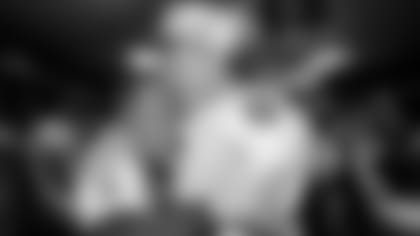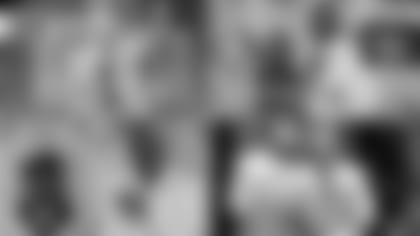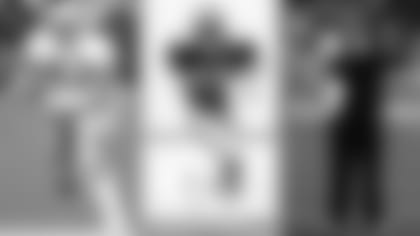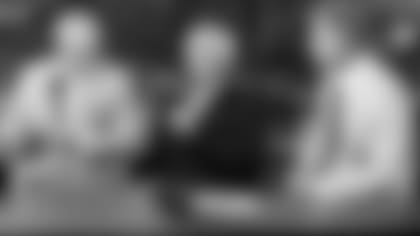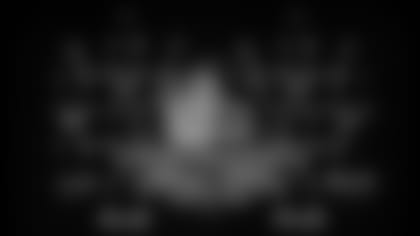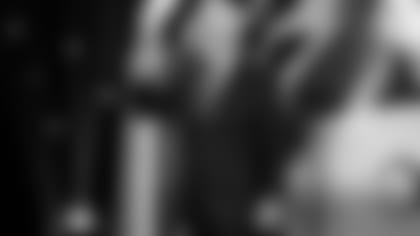When Jimmy Johnson was told in the Fox studios during halftime of a playoff game in January 2020 that he was being inducted to the Pro Football Hall of Fame, the man who has always claimed that sort of stuff wasn't important to him broke down. To the point that fellow analyst Howie Long asked the crying, speechless, two-time Super Bowl winner if he needed his asthma inhaler. Yes, the coach who famously sent one of his players to the asthma field has it himself.
By that point, the majority watching was likely fighting back a few tears, too. It was impossible not to appreciate the heartfelt shakiness Johnson was experiencing and the obvious joy of his fellow hosts. Then the Fox cameras wisely showed Troy Aikman up in the booth, himself also tearing up but at the same time overcome with the most joyful, almost proudful, expression.
First off, Aikman had no idea Johnson was going to be inducted; his producer asked him to stay in the booth for a studio interview. Second, while the moment itself was obviously emotional, Aikman's immediate thoughts were a little more detailed.
"Jimmy has never been appreciated in Dallas for what he accomplished. He's a revered figure here in Dallas, but he's never been thanked. He's never stood on the field and/or a podium and had the fans show him how much they appreciate him," Aikman says. "A lot of us have had that because of Jimmy. Now, he's going to have his day.
"This is really emotional for me to talk about. It's been weld up in me for so long. And I never thought he would get that gratitude because of the longevity issue. Then I see [ Pro Football Hall of Fame President] David Baker, and see Jimmy's reaction, and I knew he'd have that appreciation of the crowd. I knew that moment would be so meaningful for Jimmy. It's the culmination of it all."
At the time, Aikman never imagined that he would be presenting Johnson at the Hall of Fame induction. More on that later, though. It's almost best to start at the beginning, which for them means the summer of 1983.
Entering his senior year at Henryetta (Okla.) High School, Aikman was already among the top recruits in the nation. He attended Oklahoma State's football camp in Stillwater that summer and won camper of the week. Johnson was the college's head coach at the time and wanted Aikman to sign with them. Like, he was No. 1 on their list of quarterback recruits. In fact, Johnson was the first head coach to ever visit Aikman's house.
Throughout the recruiting process, Aikman figured he would end up signing with Oklahoma State, and told Johnson as much on his official visit during the second-to-last weekend of recruiting season. Johnson was thrilled. Aikman told him he was visiting Oklahoma the following weekend, but not to possibly go there. He just wanted to attend because it was the weekend all the former Heisman Trophy and All-American players attend the game. That was "a big deal and sounded really fun."
Anyone who has ever spent a few hours around Barry Switzer, quite possibly the most successful recruiter of college football players ever, knows Johnson was in trouble once Aikman walked out the door without signing.
"Part of it, too, was me coming from a small high school. I wasn't sure how I was going to stack up in college, and Barry was open to me playing safety, linebacker, tight end," Aikman says. "And I wanted a chance to win a national title, and we did. Even if I signed at Oklahoma State, I wouldn't have played for Jimmy. He left that next year for Miami."
When Aikman decided to transfer from Oklahoma, his first phone call was from Johnson, trying to land him for the Hurricanes. Originally from California, Aikman decided on UCLA.
"Jimmy was always great about it. I mean, Miami would have been a great fit, but they still won a national title, so it worked out," Aikman says. "He would always say I just want things to work out for you, Troy, which I appreciated.
"I remember I was interviewing agents in Oklahoma, and someone walked in the law firm and said, 'Did you hear what happened?' I was like, 'No, no way. You must be kidding. Jimmy's the Cowboys' head coach now?' I really wanted to be the No. 1 overall pick."
There were some among the Cowboys brass who wanted to take offensive tackle Tony Mandarich with that pick, but owner Jerry Jones and Johnson never wavered. They were basically rebuilding from scratch and it all starts with the quarterback.
A couple of months after signing the largest deal in NFL history with the Cowboys, Aikman received a phone call from Jones, who informed him Dallas was taking quarterback Timm Rosenbach of Washington State in the supplemental draft. Jones added that it was for trade purposes. A few days later, the Cowboys selected another quarterback, Steve Walsh of Miami. Yes, the one who helped Johnson win a national championship.
"It was such a bizarre situation. I was thinking that wasn't quite the plan," Aikman says. "With Steve in the mix, what was already a challenging rookie year became more so. Now, all of a sudden, there's internal conflict. Who is the quarterback?
"Steve knows the head coach and most of his staff came from Miami. I go 0-11 as the starter. I was not happy. There was a lot of frustration. Jimmy distanced himself, too. Jimmy may say now that there wasn't a competition, but I believe it was real and there was uncertainty among the staff."
Johnson indeed claims there was never any doubt in his mind who the starting quarterback was. He just couldn't tell anyone, especially not Aikman, until he was able to maximize Walsh's trade value. The Saints ended up dealing a first, a second and a third-round pick to Dallas on Sept. 25, 1990. The damage, though, was already done between head coach and quarterback.
"I didn't know how upset Troy was at the time, I honestly didn't," Johnson says. "I had to walk the fence on Troy and Steve with everyone. I couldn't rave about Troy and diminish Steve after we already drafted him. It was obvious to everyone who the better quarterback was.
"I knew there was tension. We were losing so many games (the Cowboys finished 1989 at 1-15). There was tension everywhere. I just didn't know how badly the relationship was hurt. Once we traded Steve, it was my job to repair the relationship."
Before that process could begin, though, the two had another falling out. In 1991, the Cowboys were 6-5 when Aikman went down with a knee injury. Steve Beuerlein replaced him, and Dallas won out to earn a wild-card berth. Johnson decided to not mess with a winning streak.
"I was healthy in Week 17 and Jimmy says, 'No, no, rest up for the playoffs.' And then I get a call Monday at my house from someone in the media saying I wasn't starting," Aikman says. "I walked in there Tuesday, and I told him it was total BS. He led me to believe I was starting and then doesn't even tell me himself? I was really upset, but I also told him I wouldn't be a distraction to the team.
"Let's just say, three years in, Jimmy and I were definitely not close."
No one understood this better than Johnson, the psychology major who even following his graduation from Arkansas – after winning a national title along with Jones – assumed he'd be just that, a psychologist, most likely working with corporations. Ask almost anyone who played for him, and they'd tell you, Heck of a football coach, world-class judge of football talent. But he was always a psychologist, first and foremost. And maybe the most successful coaches always are.
Aikman explains Johnson's persona better than anyone. He created an alter-ego, the bad guy. This was his go-to coaching method, and in retrospect, it's hard to argue against his mindset. Yes, he coached different guys differently. Michael Irvin wasn't being sent to the asthma field, Nate Newton wasn't running extra laps, the bus was waiting longer for Emmitt Smith than the third-string cornerback.
It's difficult to win a Super Bowl when the head coach and the quarterback dislike each other. Not impossible, Terry Bradshaw and Chuck Noll did so four times, but Johnson wanted a better relationship with Aikman. He needed a better relationship with Aikman. Ask a guy to command the huddle you aren't in and you need that bond. He needs to take a part of you into that huddle. And honestly, Johnson liked Aikman. He respected him. He realized, without admitting it at the time, that this was partly on him.
The repairing process started innocently enough during a preseason halftime ceremony honoring Roger Staubach in 1992. Aikman didn't necessarily mean to be standing next to his head coach on the sidelines. It just sort of organically happened. So when Staubach drove by in the back of a convertible, Aikman said, "Hey Coach, one of these days, you and me are going to be driving around here in a convertible."
A month later, in Week 2, the Cowboys defeated the Giants, 34-28, in East Rutherford. On the plane ride to Dallas, Aikman was drinking a few beers in the back of the plane and Jimmy walked down from first class.
"He says, 'Hey Troy, when you said that when Staubach drove by, you have no idea how much that meant to me,'" Aikman says. "He was kind of emotional about it."
Later that season, the Cowboys lost a close game to Washington in Week 15 and Johnson was furious. As Aikman has said, no one was ever better to be around after a win than Johnson and no one was worse to be around after a loss. The following night was the team Christmas party and Aikman felt like he needed to make an appearance. His teammates did not. He and Johnson started talking about fish tanks, and sure enough, later that week, the coach asked him at Friday's practice if he wanted to build an aquarium.
"It should be noted that I did nothing but drink Heinekens. Jimmy built all of it," Aikman says with a chuckle. "We were in my master bedroom, and he brings his cooler of beer, and we just talked. And he built this fish tank. We started to bond. By the following season, 1993, he'd be calling me on Tuesday, our day off, and say [his then girlfriend, now wife] Rhonda and he were in the neighborhood and wanted to check on the fish tank. Next thing I know, we're drinking beers in my bedroom.
"He started showing me the softer side in 1993. Deep down, he wanted to have a good time but thought because of the level of intensity he demanded, the certain level of play, he needed to be someone else."
It's impossible to explain the extreme of how Johnson changed the culture for the Cowboys. The man was possessed. He worked 16 hours a day, 11 months a year, even eating ribs at Tony Roma's Steakhouse with his two sons on Saturdays while taking notes on multiple college football games on the television screens.
"It was a shock going 1-15 that first year. I lost two regular-season games my last two years at Miami," Johnson says. "I remember that first training camp at Thousand Oaks. We had this weight room inside this bizarre chain-linked fence. I went there after practice and there was no one there. [Radio play-by-play man] Brad Sham was the only one, on a treadmill. I went to our strength coach at the time, and I'm like, 'Why do we bring the truck and you out here?'"
Alas, success, winning back-to-back Super Bowls in dominant fashion, didn't make the job any easier. It never has.
"I remember Bill Belichick coming down to visit [in the Florida Keys] after his first Super Bowl," Johnson says of his close friend. "He's saying everyone is turning around and saying what about me? The team secretary wants a raise, no one is getting enough credit.
"Terry Bradshaw says when I was coaching, and even in my early days at Fox, I was a complete jerk. The person I was on the sidelines and the person I am now are complete opposites."
Aikman, perhaps more than anyone, has also seen that transformation.
"He lives each day like he's living the last day of his life, but he's still a complicated guy. There's still a small circle of people he lets in," Aikman says. "He's protective of his territory, but he's so awesome, fun and generous once you are on the inside. He's so complicated and brilliant, but his edges are a little softer and a rounded version than before. I enjoy that about him so much. I have never been more proud of any friendship than mine with Jimmy."
There's no reason to delve into depth on the subject, but it's impossible to talk about that team without a level of frustration coming up concerning the Jones-Johnson fallout following the second Lombardi Trophy. The lone need to bring this up is a dinner conversation between Aikman and Johnson a couple of years ago.
"He was so angry. It was the first time I fully realized how much of an impact it had on people I cared about," Johnson says. "He said we could have been the Belichick and Tom Brady of our time."
Johnson left the team – it doesn't matter in the least now how – a few months after winning a second Super Bowl. Aikman was with Johnson the day before the stunning announcement in the Bahamas, as he was fishing with some buddies. Johnson found out, it was one of his go-to vacation spots, and showed up the following morning, the two of them talking team personnel.
"I understand Jimmy wouldn't get it. Our perspective was we hate what happened, and I guess we were more upset that Jimmy didn't feel how upset we were," Aikman says. "At the end of the day, we appreciate what he did for us. He carried us to places we didn't know we could go."
Jimmy Johnson will be inducted into the Pro Football Hall of Fame as part of the 2020 Centennial Class on Saturday, Aug. 7. He will be joined by former safety Cliff Harris while wide receiver Drew Pearson will be inducted on Sunday, Aug. 8, as part of the 2021 Hall of Fame class. To find out more information, visit profootballhof.com.



